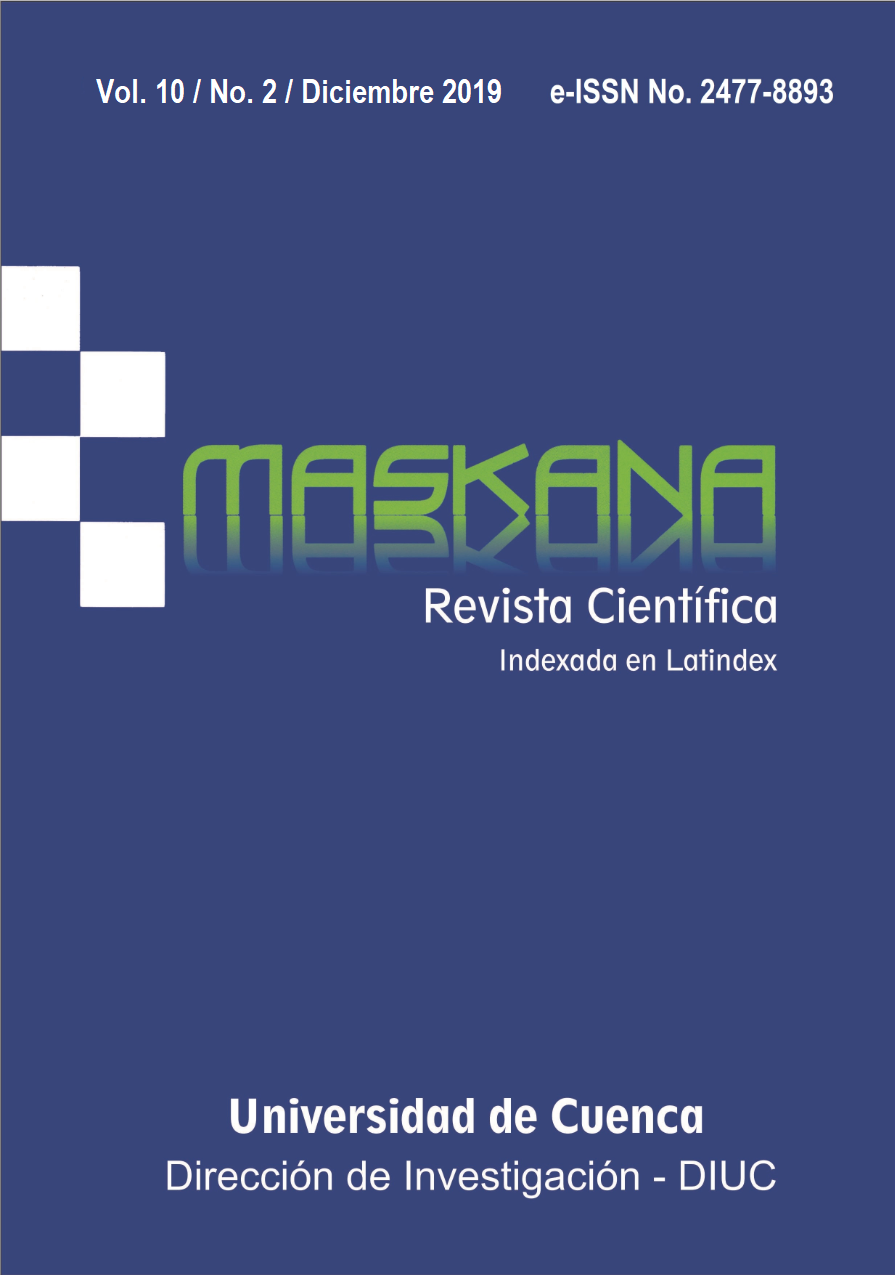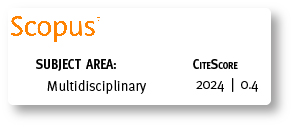WAKE-UP CALL for Ecuador’s universities
DOI:
https://doi.org/10.18537/mskn.10.02.01Keywords:
University ranking, 21st century challenges, reengineering of HEIs, shared governance, multidisciplinary nature of problems, inter-faculty and inter-university cooperationAbstract
The definition of wake-up call is something that alerts people to an unsatisfactory situation and drives them to remedy it. In this sense, today's publication of QS World University Rankings 2020 can be seen as a wake-up call for Ecuador’s universities, SENESCYT, CACES and CES. First, the article assesses the performance of Ecuador’s universities using the QS World University Rankings 2020 method. The analysis reveals that the group of Ecuadorian universities with better performance is extremely small and, in addition, most of the institutions included in the 2020 QS ranking saw their ranking declined with respect to their ranking in 2019. Parallel to the QS ranking, the publication record in SCOPUS journals of 11 better ranked Ecuadorian universities was analyzed for the period 2009-2019. The average annual number of published papers increased drastically in this period from 22.2 to 192 (873%), although the surveyed institutions saw their annual publication record raising, some of them were not able to maintain their position. The second section of the manuscript highlights what the Ecuadorian universities ought to do to improve their performance and their contribution to the progress of society. According to the author, universities must urgently invest in quality, take advantage of the potential of modern learning methods, make research a mature and equivalent component, stimulate cross-border collaboration at all levels and convert the spin-off into hubs of innovation. Doing so requires not only a changing attitude of the authorities, but of the entire academic community of professors and researchers, administrative and technical personnel, but most importantly of the government administrations in charge of higher education. To convert public HEIs into institutions that are capable of offering graduates who possess the knowledge and skills necessary to face the challenges of today and tomorrow while ensuring sustainable economic growth in harmony with the environment, universities must be reengineered in a straightforward way. The institutional pillars subject for renewal are described in the third section of this article. To convert the reengineering of the university into a feasible project, it is essential that the ones that make the decisions open their mind and realize that universities in the 21st century require a completely different governance. Additionally, the noses of all personnel should be turned in the same direction, personnel cooperate intensely, and corruption, collusion and nepotism are eliminated.
Downloads
Metrics
References
Bryde, D., & Leighton, D. (2009). Improving HEI productivity and performance through project management. Educational Management Administration & Leadership, 37(5), 705-721. https://doi.org/10.1177/1741143209339649
Burke, J. C. (2002). Funding public colleges and universities for performance. Birmingham, Alabama, USA: Rockefeller Institute Press.
Cardoso, S., Tavares, O., & Sin, C. (2015). The quality of teaching staff: higher education institutions’ compliance with the European Standards and Guidelines for Quality Assurance – the case of Portugal. Educational Assessment, Evaluation and Accountability, 27, 205-222. https://doi.org/10.1007/s11092-015-9211-z
Connor, A. M., Karmokar, S., & Whittington, C. (2015). From STEM to STEAM: Strategies for enhancing engineering & technology education. International Journal of Engineering Pedagogy, 5(2), 37-47. http://dx.doi.org/10.3991/ijep.v5i2.4458
de Boer, H., Jongbloed, B., Benneworth, P., Cremonini, L., Kolster, R., Kottmann, A., Lemmens-Krug, K., & Vossensteyn, H. (2015). Performance-based funding and performance agreements in fourteen higher education systems. Report for the Ministry of Education, Culture and Science, 164 pp. Center for Higher Education Policy Studies, Universiteit of Twente, Enschede, The Netherlands.
Dumciuviene, D. (2015). The impact of education policy to country economic development. Procedia – Social and Behaviorial Sciences, 191, 2477-2436. https://doi.org/10.1016/j.sbspro.2015.04.302
El Mercurio (2019). Ecuador está 20 años por detrás de su entorno en innovación científica. Disponible en https://ww2.elmercurio.com.ec/2019/05/27/ecuador-esta-20-anos-por-detras-de-su-entorno-en-innovacion-cientifica/
European Commission (2014). Performance agreements and their relationship to funding in higher education. The Hague, The Netherlands: ET2020 country workshop.
Hauptfeld-Göllner, P. (2016). Five ways the lecture halls of 2030 will be different. The 28th Conference of the European Association for International Educators (EAIE). Liverpool, UK. Available at https://www.timeshighereducation.com/news/european-association-for-international-education-eaie-conference-2016-five-ways-the-lecture-halls-of-2030-will-be-different
Heitor, M., & Horta, H. (2016). Reforming higher education in Portugal in times of uncertainty: The importance of illities, as non-functional requirements. Technological Forecasting and Social Change, 113(Part B), 146-156. https://doi.org/j.techfore.2015.09.027
Herbst, M. (2007). Financing public universities: the case of performance funding. Dordrecht, The Netherlands: Springer.
Jiju, A., Krishan, N., Cullen, D., & Kumar, M. (2012). Lean Six Sigma for higher education institutions (HEIs). Challenges, barriers, success factors, tools/techniques. International Journal of Productivity and Performance Management, 61(8), 940-948. https://doi.org/10.1108/1741040121177165
Król, A. I., & Dziechciarz-Duda, M. (2013). On the non-monetary benefits of tertiary education. Ekonometria, 41, 78-94.
Leach, A. (2015). 15 steps closer to quality higher education in Africa. The Guardian. Available at https://www.theguardian.com/global-development-professionals-network/2015/aug/10/15-steps-closer-to-quality-higher-education-in-africa
Madden, M. E., Baxter, M., Beauchamp, H., Bouchard, K., Habermas, D., …, et al. 2013. Rethinking STEM education: An interdisciplinary STEAM curriculum. Procedia Computer Science, 20, 541-546. https://doi.org/10.1016/j.procs.2013.09.316
O’Brien, J. (2008). Are we preparing young people for 21st century citizenship with 20th century thinking? Contemporary Issues in Technology and Teacher Education. [Online serial], 8(2), Retrieved from https://www.citejournal.org/volume-8/issue-2-08/social-studies/are-we-preparing-young-people-for-21st-century-citizenship-with-20th-century-thinking-a-case-for-a-virtual-laboratory-of-democracy
Özsoy, C. E. (2008). The contribution of higher education to economic development. In: Ciampi, F., & Gupta, A. (Eds.). Proceedings of the 8th Global Conference on Business & Economics, 1354 pp. Lynchburg, Virginia, USA.
Prakash, G. (2018). Quality in higher education institutions: insights from the literature. The TQM Journal, 30(6), 732-748. https://doi.org/10.1108/TQM-04-2017-0043
QS World University Ranking (2020). The top 200 universities in Latin America. 64 pág. Disponible en https://www.topuniversities.com/universities/country/ecuador
QS World University Ranking (2020). Who rules? The world’s top universities in 2020. 56 pág. Disponible en https://www.topuniversities.com/university-rankings/world-university-rankings/2020
Reichert, S., & Tauch, C. (2004). Reforming Europe’s higher education area: As the fog clears, new obstacles emerge. International Educator, 13(1), 34-41.
SCOPUS-Reed Elsevier. (2019). Disponible en https://www.scopus.com/
Underwood, J., Williams, A., & Thurairajah, N. (2009). Improving performance through HEI-industry engagements in the built environment. Industry & Higher Education, 23(1), 39-49.
Walker, M. (2015). Imagining STEM higher education futures: advancing human well-being. Higher Education, 70, 417-425. htpps://doi.org/10.1007/s10734-014-9843-9
Published
How to Cite
Issue
Section
License
Copyright © Autors. Creative Commons Attribution 4.0 License. for any article submitted from 6 June 2017 onwards. For manuscripts submitted before, the CC BY 3.0 License was used.
![]()
You are free to:
 |
Share — copy and redistribute the material in any medium or format |
 |
Adapt — remix, transform, and build upon the material for any purpose, even commercially. |
Under the following conditions:
 |
Attribution — You must give appropriate credit, provide a link to the licence, and indicate if changes were made. You may do so in any reasonable manner, but not in any way that suggests the licenser endorses you or your use. |
| No additional restrictions — You may not apply legal terms or technological measures that legally restrict others from doing anything the licence permits. |









